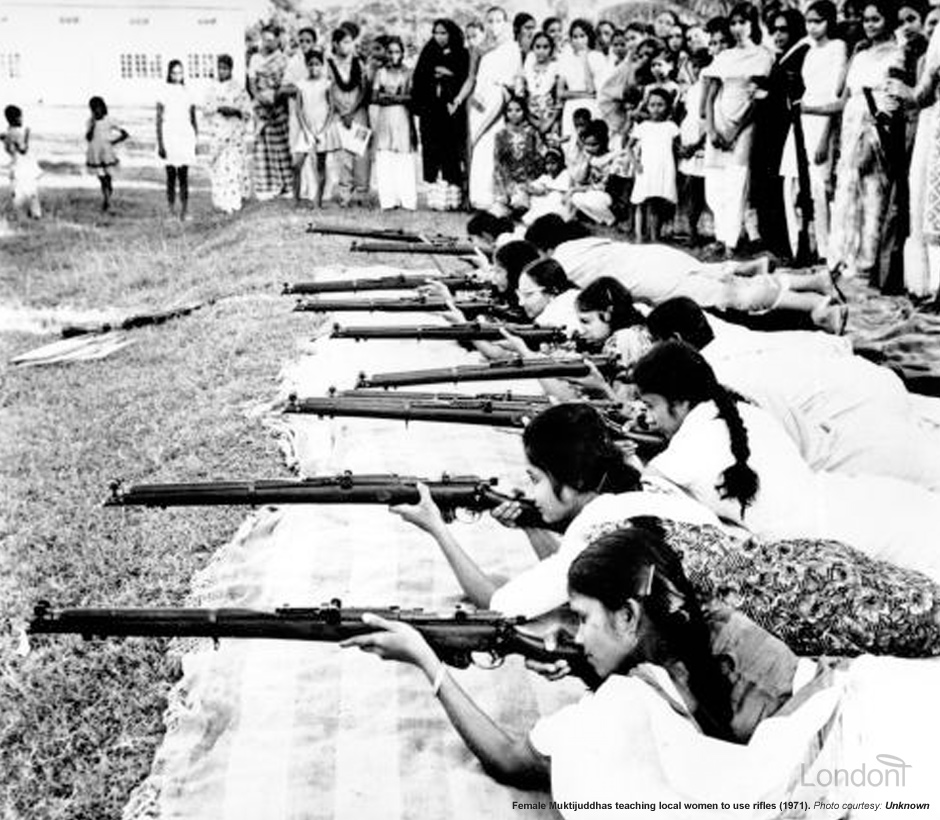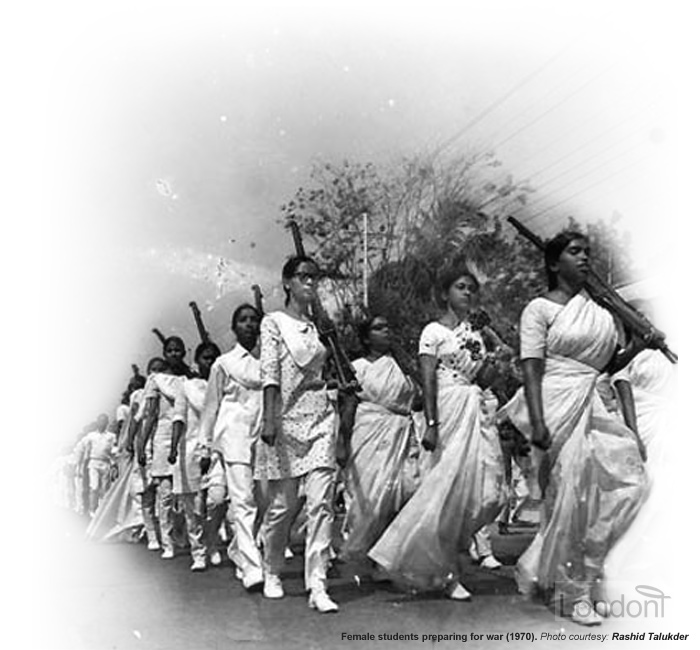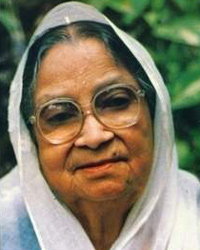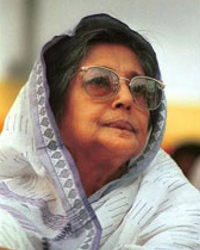
Women muktijuddha - overcoming personal tragedies to help others
Last updated: 5 October 2017 From the section 1971 Muktijuddho
The vast majority of the coverage of women’s role in the 1971 war has centered on women as victims. However, even under such harrowing atmosphere and personal grievances, women fought in the war in so many different ways. They were active and willing participant in the fight for Bangladesh's independence.
They collected and distributed clothes and other necessary items for the children in the refugee camps. They took part in activities of the Mujibnagar government-in-exile who had their headquarter in Kolkata. Others hid weapons in the well of their home and and took these to local freedom fighters in nearby island on a boat during the night, steering the boat by themselves. Sometimes the Muktijuddhas would spent nights in their house and on they would keep vigil very often passing the whole night sleepless.
Women were guerrilla fighters, mothers, nurses, wives, informants, daughters, spies and so much more. They fought, spied, smuggled weapons, and trained - actions traditionally attributed to men. Their suffering may have been manifold, but so were their achievement and contribution.
The line between mukti juddha and birangona is often much more blurred than mainstream narratives will allow. That many women were captured and raped precisely because they were fighting for their country, spying within West Pakistani army camps, collecting information to relay back to fellow Bangladeshi guerrilla fighters. Yet they are not remembered as fighters. They are remembered as victims.
In 1971, I was just 16 year old and an active part of the leftist party of Barisal. I was too young to know what it really meant to be a political activist...Pretty soon I was helping my brothers write the leaflets and paint walls with slogans using crushed coal for ink.
In those days women had to wear a 'ghomta' (a veil over their head). Things like romance and talking to boys were not done, at least not openly. Women did not have exposure to a lot of things. Nevertheless, when the time came to stand side-by-side with the men to defend the country, women stepped up to the cause.
No woman was forced to go or called to go. Everyone went on their own. What was the point of staying home? Either way we would be attacked at the hands of the Pakistani Army or by rajakars (Bengali collaborators).
My mother cried a lot when I left. She still cries for my brothers who died in the war.
When I joined, I met many courageous women Monika, Bithika Ray, Reba, Rekha, Nur Jahan. Some had been tortured, some had lost their houses to arson, some came with their husbands.
My first weapon was the 3-knot-3 rifle. We didn't have a whole lot of arms. Later I carried a light machine gun (LMG), the pistol and hand grenades. At first I was scared about joining the war. But then my courage built up and it has stayed with me. To this day, I have no fear of dying. When the Liberation War began, Bengalis formed a togetherness for one cause that had ever existed before or will ever exist again. There was no difference between male and female. We often slept side by side across the floor, but at no point were we ever disrespected.
I wore a sari when I joined, then I started wearing a lungi. When that became too inconvenient and finally I moved on to wearing shirts with pants.
It was the practical thing to do. We had to go through rice paddy and khals (small lakes), wading knee-deep in water. Sometimes the water even came up to our shoulders.
We had to stay in the same clothes often for 4 or 5 days at a time without bathing or eating. During the war I killed members of the Pakistani Army and rajakars. I used my guns and I used my bayonet. I gained a lot strength of mind during that time. That strength of mind is helped me through the bad times.
The first man I killed was a rajakar. I thought it was justified because he has betrayed and wronged people. The rajakars, who were Bengalis, would guide the Pakistani Army to houses that had young women or active freedom fighters. The Army tortured, raped and killed these people to set an example and send a message to the terrorised Bengali people on where they stood.
When victory was declared in December of 1971 it was the most joyous moment.
My return to home was a different story. People did not look highly on women who joined the war. And though not a single Pakistani Army officer had laid a hand on me during the war, rumours had gone around about the possibility that I was manhandled or worse. Two months after independence, my husband was lured out of our house by government officials, taken to Jhalokati and killed. I was three months pregnant.
After his death, I went to a relative's house in Dhaka because I knew I would not be accepted back home. She sent me back to my father's house. The community did not receive me well. My parents took me in, but I got cold treatment. I kept going back and forth between my in-laws house and my parent's house.
I knew I had to stand on my own. I took up odd jobs paying a monthly salary of taka 40. I sewed, I tutored until I was financially solvent. I used to cry a lot. I used to beat my daughter. I took my anger out on her. I have nothing to hide. Have I said anything that should bring me shame? This is just the bare truth.
What I faced after I returned from the war, it cannot be expressed in words. And it did not stop with family and community. Politics that was once a higher cause, became debased. Since independence, I have not continued politics. I have been earning a living and raising my family. I have learned a lot from life experience. My mission is to pass this knowledge to my daughters. The pain of hunger is a strong pain. The real war is not fighting in the battle fields. It is what comes after the War.
I have led a very different life. I am happy about that. It has given me the opportunity to have many valuable life experiences.
If I could tell anything to today's young woman I would tell them to educate themselves, they have many opportunities we didn't. Learn to stand on your own.
I grew up in a political environment. My mother and father were both part of the Communist Party. In fact my mother was the 'Gono' Party's central member. My maternal uncles were also very political. My involvement was a long-term process - it didn't just start with the War. At the time the war started I was studying Bangla Honours at Edward College.
Women fought in different ways away from the forefront in the Liberation War. They somehow, almost miraculously tore down trees and laying them down on streets, barricading the Pakistani soldiers from moving forward. To Bengali freedom fighters they provided rice, shelter and information. Every house was a camp against the Pakistani Army.
Socially, women could not just join the war by showing up in a sari. I went in men's clothes - pants and shirts. I was 21 year old, lean and thin. Nobody could identify me as a woman. Only a couple of my close associates knew.
Pakshi Bridge in Pabna is where I saw my first armed conflict. I was in the forefront at the first phase of the war. There were 28 of us in my military camp. Almost all of them died. Sometimes people who were right next to me were killed.
What I saw as we moved forward was the remains of massacre after massacre. Lots of corpses on the streets. The group often had to split up, we were often separated for long periods of time from those we knew through the struggle. When we advanced from Pabna to Pakshi Bridge in Kushtia, I found myself among a group of strangers. When I did come across familiar people and we inquired about people who were missing I would get answers like "He died in the juddho".
When I first saw a Pakistani soldier, I was disgusted. Our rights, our votes, we should have had our Prime Minister, but they denied these things to us and instead turned on us.
The freedom struggle was the work of a lot of anger about that, which is what gave us the inspiration to fight.
There were some difficulties as a woman. In order to hide my identity, I would not bathe for days. Sometimes, I would go 10-15 days with bathing. A cousin who knew my identity, would explain to the others in the pond that I didn't know how to swim. When I had to go to the toilet, I had to wait until night.
The Pabna District Commissioner, Nurul Kader Khan knew there was a woman among the group, but he couldn't identify me even when I was standing right in front of our group as he addressed us. Once a foreign journalist who found out their was a woman in our regimen, asked to see me. Mr Khan asked our group where I was. He was shocked when someone responded pointing to me, "She's here." The journalist took a picture of me with a gun, which brought me a lot of recognition. The Statement of India, wrote a piece about me titled, "A Shy Girl with a Gun". But I actually fought only for a short time with arms. There were so many others, Taramon Bibi, Runa Das, Bithika Biswas who fought with me. But they didn't get published at the time.
I was in Pabna till April. I carried a 3-knot 3-Rifle, a 2-2 bolt these were weapons our Pabna DC collected from the police to distribute to people. We didn't have many arms. We used what we had. I started off using a large fish 'boti' (knife to cut fish) for a long time. When we ran out of ammunition we had to retreat further and further. We eventually went to India for support and to request for more weaponry. In India, they didn't give weapons to us at first.
There was a training camp for women. Sajedur Chowdhury was in charge of the women's training camp in India. I was in the first batch, which had 234 women. We organised ourselves and motivated the people of India to support the Bangladeshi cause. The Communist Parties of the two countries had a strong link.
I provided nursing and military training to some of the women in the camp. Though I thought I would eventually return to Bangladesh to fight in the war, I did not end up returning for the rest of the year. My first day back in Bangladesh was first of the new year, 1972.
When the war was over, we thought all of our dreams would come true. All of our dreams did not materialise. Our secular constitution was replaced with an Islamic constitution, we did not get freedom of religion, freedom from hunger, freedom from discrimination.
There is a long history and politics behind the war. A lot of misinformation has been produced since 1971 and now it is creeping into our children's history books. That is why it so important for me and others who were part of history to tell our stories.
The Liberation War of 1971 didn't just begin overnight. It took long years of mobilising people towards the cause of gaining an independent nation. It took time to motivate people, educate people on their rights, and prepare people for this kind of movement. My family and I had been involved in this process leading up to the war.
Fighting for independence was in my blood. My mother was a "Bhasha Shohinik" (activist in Language Movement of 52). Before that, my parents and maternal uncles were active in the struggle for independence of India from the British. The Brits called them "terrorists".
I had been involved with Chatra League for years. The West Pakistan governance created a disparity between the two Pakistans, they cheated us. We realised we had to stand on our own, we had to survive, we had to protect ourselves.
Bengalis are generally a peace-loving people. But when the Pakistani's unleashed such unbridled, inhumane atrocities, we as a people became furious.
When the war started, I helped establish camps for those who lost their homes. Among the displaced in the camps, we selected the young, strong ones to fight in the war. We collected arms and provided arms training.
We also collected funds for food, shelter, medicine and establishing nursing centers for the wounded. I was the leader of the Women's Guerrilla Squad in Agartala. I trained women to fight and use arms. We used our friends and relatives who were on duty in the Pakistani Army to help us free the captured.
Because of all my activities, I always carried a Chinese pistol. When I was with the others, fighting on the streets, I carried grenades.
During this terrible time, I saw villages set on fire, burning in the wake of the Pakistan's infiltration. The corpses we saw along our path saddened me and fuelled the fires to fight against injustice.
Sometimes we didn't eat for days, we walked miles, sometimes eating fruits on our way.
I did not face too much trouble joining the cause of war as a women. Actually, I was trained from childhood to do this. Besides, I went to a coed school and came from a broadminded family.
We all went through lots of trouble, but we did it for love of our nation. In the name of "Desh Prem" people can do anything.
After Muktijuddho, I did not associate with any political party because the country was free. The political party was just a vehicle to get there. Instead, I put my energies into social work, humanist activities, working for the poor. I write and I have actively called on the government to recognize freedom fighters.
We hear lots of bad comments; when I cross road people call me wife of the Pakistani military. They tell us that they will not bury us after we die. Why do we bear this sorrow? How can we go to the government?
During the Liberation War, there was a bridge in front of my house, and all of the freedom fighters’ weapons were in our house. On the day that the freedom fighters blew up that bridge, I was with them. I passed all the weapons with my own hands from our house. The freedom fighters who are still alive told the government that I was a mukti juddha, but people not call me mukti juddha they call me birangona. What can I do? Where can I speak? Razakars [traitors to Bangladeshi guerrilla fighters] now have freedom fighters’ certificates; they stay in houses and buildings now, and we stay under the banana leaf. I cooked rice for the freedom fighters, I hid all the time, brought them their weapons. Now, I am not a mukti juddha, but they [razakars] are? Twenty days after the war started I went to the Pakistani military’s hospital, gathered information – where the Pakistani army’s weapons were, where they were planning to go – all that information I gave to the freedom fighters.
Now I don’t want tell any more. I talk about my experience time and time again, but nobody has done anything. The government has not given us freedom fighters’ certificates, but razakars have those certificates. I have proof that I was a fighter. But now, I have nothing to show for it. It would be better if we were dead. Take me in front of the government, I will tell them to kill us by shooting us. It would be much better than how we live.
Asiya, one of the women at SUMS
Account of their remarkable resilience and strength were captured in two films - 'Narir Kotha' by Tareq and Catherine Masud and 'Tahader Juddho' by journalist Afsan Chowdhury.
But the most important role the women played besides taking active participation in the war and helping the Muktijodhas in various ways was as sustainers of families and households. These remarkably courageous women have waged a tough struggle to keep the family going on, raised their children and passed on the spirit of fighting to them. Whether they find room in the pages of history or not, it is an undeniable truth that it was their sacrifice and strength that helped the Bengalis win the freedom. For these poor, ordinary village women who had to fight simultaneous enemies on personal social and national level, the fight goes on.
A woman’s war is unique – she has to fight not only on the battlefield, but also at her home, as the anchor of a family during the hardship of war.
And it's on standing on these households that society itself survived in 1971.
Afsan Chowdhury, Journalist

Bangladesh Mahila Parishad
On 4 April 1970 poet and social reformer Begum Sufia Kamal founded the Bangladesh (then East Pakistan) Mahila Parishad (Women's Council of Bangladesh), a women's human right organization. It's ran by voluntary members and any women above the age of 16 can join the organisation.
Bangladesh Mahila Parishad is devoted to establish a democratic, secular, discrimination free family, society and state in the light of united for human rights and on the basis of the spirit of our liberation war.
Bangladesh Mahila Parishad website
During the Shadinota Juddho they published an emotionally powerful book "To the Conscience of People" (1971) from within the blockaded Dhaka city. It contained photographs and vivid description that showed how Bengali women were tortured by the officers and soldiers of the West Pakistan army and by their collaborators.
The Bangladesh Mahila Parishad's contribution include amendment to the inheritance law, introduction of direct election of women representatives in reserved seats of the Parliament and introduction of free education for girls in junior high schools . They also fought to ban the dowry system, which was passed by the governement in 1980. Other activities include organising mass movement against polygamy, child-marriage, women trafficking and prostitution, and providing legal aid to oppressed women.
Another powerful book that was written during 1971 was "Ekatturer Dinguli" (The days of '71) by Jahanara Imam. It is a diary of her personal account of the Bangladesh Liberation War tragedy in which she lost her eldest son Shafi Imam Rumi, aged 19, and her husband, who died three days before Victory Day of 16 December 1971.
 Sufia Kamal ()
Sufia Kamal ()  Jahanara Imam ()
Jahanara Imam ()
One of the greatest shortcomings in the perception of our fight for Independence is our consistent failure to recognise the role of women in our Liberation War. In fact, the role of women is largely ignored, denied and misconstrued in our mainstream history. This is because of our general tendency to think of war only in terms of physical fighting and exchange of gunshots. But our liberation war or any war for that matter, which has involved the entire population of the country, has been a struggle through which a united nation has asserted its aspiration for freedom. Such wars are not fought only in the battlefields, neither are they fought only with guns.
War heroes include those women who have supported the valiant freedom fighters with food, shelter, funds; who have nursed the wounded and hid weapons risking their own lives. They also include those who have willingly given their sons to war, who have lost their loved ones and even worse been subjected to sexual abuse and still survived to tell their stories.
Aasha Mehreen Amin, Lavina Ambreen Ahmed and Shamim Ahsan, Campaigners
